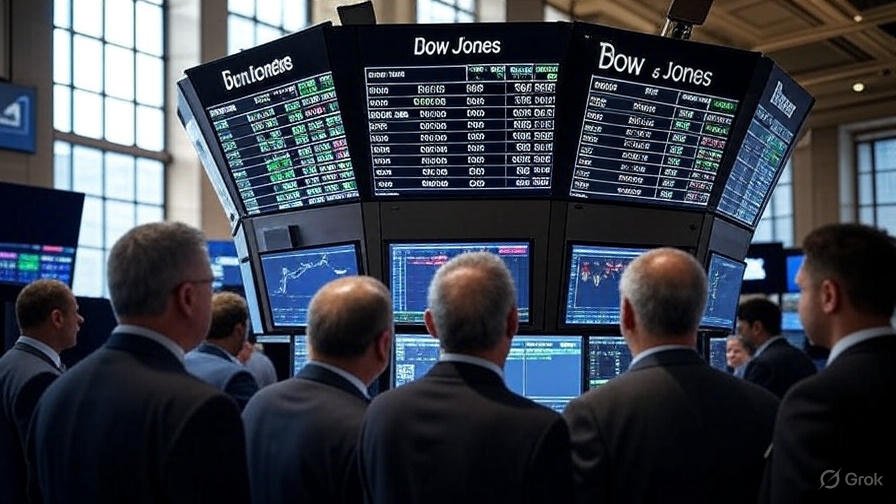The Dow Jones Industrial Average, often just called “the Dow,” is one of those terms you hear thrown around in news reports, especially when the stock market is making headlines. If you’re new to the world of finance, it can feel like a mysterious beast. But don’t worry—I’m here to break it down in a way that’s easy to grasp, like chatting with a friend over coffee. In this post, we’ll explore what the Dow Jones is, why it matters, and how it reflects the broader economy. Let’s dive in!
Table of Contents
What Is the Dow Jones Industrial Average?
The Dow Jones Industrial Average is a stock market index that tracks the performance of 30 major U.S. companies. Think of it as a snapshot of how some of the biggest players in industries like technology, finance, and healthcare are doing. Created in 1896 by Charles Dow and Edward Jones, it’s one of the oldest and most-watched indices in the world. Companies like Apple, Microsoft, and Goldman Sachs are part of this elite group, and their stock prices determine the Dow’s daily movements.
The Dow is often used as a quick gauge of the U.S. economy’s health. When you hear “the Dow was up 200 points today,” it means the combined stock prices of these 30 companies rose, signaling investor confidence. But it’s not the whole picture—30 companies can’t represent every corner of the economy, which is why other indices like the S&P 500 are also important. Still, the Dow’s simplicity makes it a go-to for headlines.
Why Does the Dow Matter to You?
You might be thinking, “I’m not a Wall Street trader—why should I care about the Dow?” Well, it affects more than just stockbrokers. The Dow reflects investor sentiment, which can influence everything from your retirement savings to the cost of goods. If you have a 401(k) or pension plan, chances are some of your money is tied to companies in the Dow. When it surges or crashes, it can impact your financial future.
Plus, the Dow often mirrors broader economic trends. A rising Dow might mean businesses are thriving, which could lead to more jobs or higher wages. On the flip side, a sharp drop could signal economic trouble, like inflation or a looming recession. Even if you don’t own stocks, these shifts can affect the price of gas, groceries, or your next car loan. Keeping an eye on the Dow gives you a sense of where the economy might be headed.
How Does the Dow Work?
The Dow is a price-weighted index, which sounds fancy but is pretty straightforward. Unlike other indices that factor in a company’s total market value, the Dow calculates its value based solely on the stock prices of its 30 companies. Higher-priced stocks have a bigger impact on the index’s movement. For example, a $100 stock moving $1 affects the Dow more than a $10 stock moving $1.
Every day, the stock prices of these companies are added up, adjusted by a special divisor to smooth out things like stock splits, and voilà—you get the Dow’s value in points. On July 28, 2025, for instance, the Dow might hover around 40,000 points, a number that’s more about tracking trends than representing actual dollars. It’s like a thermometer for the market—rising or falling points show the market’s temperature.

What Drives the Dow’s Ups and Downs?
The Dow is like a rollercoaster, and plenty of factors can send it soaring or plummeting. Economic data, like unemployment reports or inflation numbers, plays a huge role. If a report shows strong job growth, investors might feel optimistic, pushing the Dow up. Bad news, like rising interest rates, can spook the market and drag it down.
Global events also matter. Trade tensions, geopolitical conflicts, or even natural disasters can shake investor confidence. For example, if there’s uncertainty about oil prices due to Middle East tensions, energy companies in the Dow might take a hit. Company-specific news, like a blockbuster earnings report from Apple or a scandal at Boeing, can also move the needle. It’s a mix of big-picture economics and individual company performance.
Should You Invest Based on the Dow?
Here’s the million-dollar question: Should you base your investment decisions on the Dow? Honestly, it’s not the best idea to put all your eggs in one basket. The Dow only tracks 30 companies, so it’s not as diverse as other indices like the S&P 500, which covers 500 companies across more sectors. If you’re thinking about investing, consider funds that track broader indices or diversify across different asset types, like bonds or international stocks.
That said, the Dow is still a great starting point for understanding market trends. Watching it can help you learn how markets react to news and get a feel for investing. If you’re curious, talk to a financial advisor or start small with low-cost index funds. The key is to stay informed without getting swept up in daily market swings—patience is your friend in the stock market.
In short, the Dow Jones Industrial Average is more than just a number on the news. It’s a window into the economy, a reflection of investor mood, and a piece of the puzzle for your financial future. By understanding what it is and how it works, you’re better equipped to navigate the world of money—whether you’re investing or just keeping tabs on the economy.